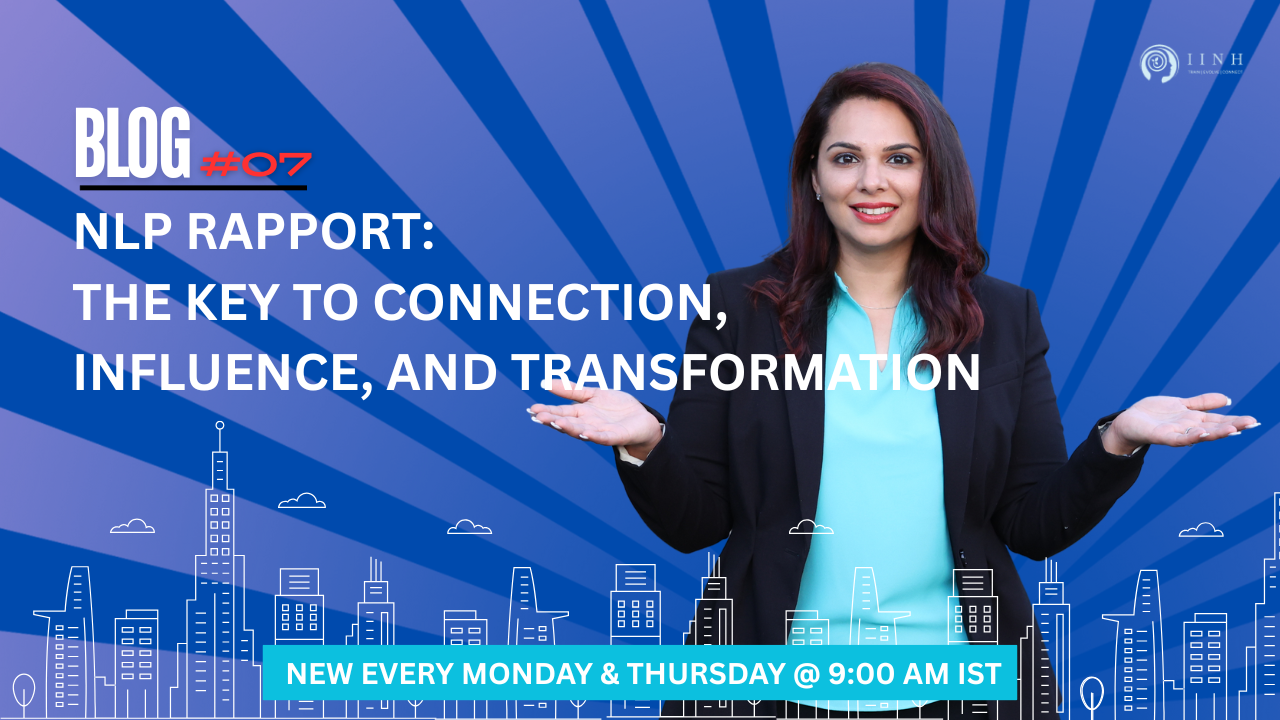The Key to Connection, Influence, and Transformation
Oct 28, 2025
NLP Rapport: The Key to Connection, Influence, and Transformation
Why is NLP Rapport So Important?
Have you ever felt instantly comfortable around someone—as if you’ve known them forever? That’s rapport in action. In the world of Neuro-Linguistic Programming (NLP), rapport is more than just getting along. It’s the foundational skill that allows deep connection, trust, and communication to happen—often without a word being spoken.
Whether you're a coach, therapist, leader, teacher, or someone simply looking to communicate more effectively, mastering NLP rapport techniques will radically improve the quality of your interactions. From building client trust to negotiating business deals, rapport is what makes influence possible. And if you're serious about personal development or professional transformation, understanding rapport is where it all begins.
What is Rapport in NLP?
In NLP, rapport is defined as a state of mutual trust, connection, and responsiveness, where communication flows naturally on both verbal and non-verbal levels. It’s that sense of “being on the same wavelength” with someone.
Rapport allows people to feel:
Heard
Understood
Accepted
According to NLP principles, when you are in rapport with someone, their unconscious mind is more open to influence, feedback, and learning. It’s why great coaches, therapists, and communicators spend more time creating rapport than delivering advice.
There are several core principles and techniques used to establish NLP rapport:
Matching and mirroring: subtly aligning body language, voice tone, gestures, and posture.
Pacing and leading: meeting someone where they are (pace), then gently guiding them in a new direction (lead).
Using sensory language: speaking in terms that match a person’s preferred representational system (visual, auditory, kinaesthetic, etc.)
Creating likeness: finding common ground in values, beliefs, or communication style.
Ultimately, rapport is not manipulation. It’s about honestly tuning into someone’s world, respecting it, and speaking their language—literally and metaphorically.
How Do You Build Rapport Using NLP Techniques?
At our NLP Training Institute, we teach several powerful techniques for rapidly building rapport. Here’s how you can start using them today:
1. Matching & Mirroring Physiology
Observe the other person’s body language—are they leaning forward? Do they cross their legs? Match them subtly. This creates unconscious likeness and comfort.
2. Match Voice and Language
Listen to their tone, speed, and sensory language. Are they saying, “I see what you mean” (visual) or “That feels right” (kinaesthetic)? Match that style in your replies.
3. Pace Before You Lead
Before guiding someone toward a new idea, match their current state or language. Once trust is established, they’re more likely to follow your lead—this is called pacing and leading.
4. Use Their Words
People often emphasize certain words that matter to them. Reflect these words back naturally to show understanding.
5. Create Emotional Safety
Ask questions that show you care. Create space for vulnerability by being open yourself. A state of rapport invites openness and deepens emotional connection.
6. Practice the Rapport Test
Once you think rapport is established, try subtly changing your posture or taking a sip of water. If the other person follows suit, you're in rapport. If not, continue pacing.
“When people are like each other, they tend to like each other.” – NLP Principle
What If You Mastered Rapport?
Imagine how your life would change if you could naturally connect with anyone—clients, colleagues, even strangers—within minutes. Here’s what’s possible when you apply NLP rapport training:
Boost coaching results: Clients feel safe to open up and go deeper.
Enhance leadership: Lead with empathy and influence without resistance.
Improve sales conversations: Build trust, reduce objections, and close more deals.
Strengthen relationships: Connect authentically and resolve conflict effortlessly.
Accelerate learning: Teach and learn faster by tuning into others’ learning styles.
But rapport isn’t just a technique. It’s a mindset. It requires curiosity, presence, and the courage to be authentic. When you build rapport from this place, transformation happens—naturally.
At our NLP Training Institute, we go beyond theory. We show you how to build rapport in real time, with real people—whether you're coaching, managing, parenting .
Our worldwide NLP training is practical, hands-on, and tailored to your goals. We’ll teach you how to read people, connect faster, and create a space where growth and change can truly happen.
👉 Curious to experience it for yourself?
Click here to learn more about our certified NLP programs and how to get started.
Keywords: NLP rapport, what is rapport in NLP, build rapport NLP, NLP rapport techniques, NLP coaching, NLP training, pacing and leading, matching and mirroring, 1:1 NLP training
Ready to unlock your full potential? Book a free discovery call today and experience the transformation.
Click here to learn more about our certified NLP programs and how to get started
#NLP #Rapport #NLPTraining #Mindset #Coaching #PersonalDevelopment #Success #Influence #Leadership #Transformation #NLPcoach #SelfGrowth #Communication #NLPpractitioner #EmotionalIntelligence #NLPtechniques #NLPindia #NLPtips #BuildingRapport #NLPtools #NeuroLinguisticProgramming #PeakPerformance #NLPskills #GrowthMindset #SuccessMindset #Empowerment #NLPcommunity #SelfImprovement #ChangeYourLife #LifeCoaching.
